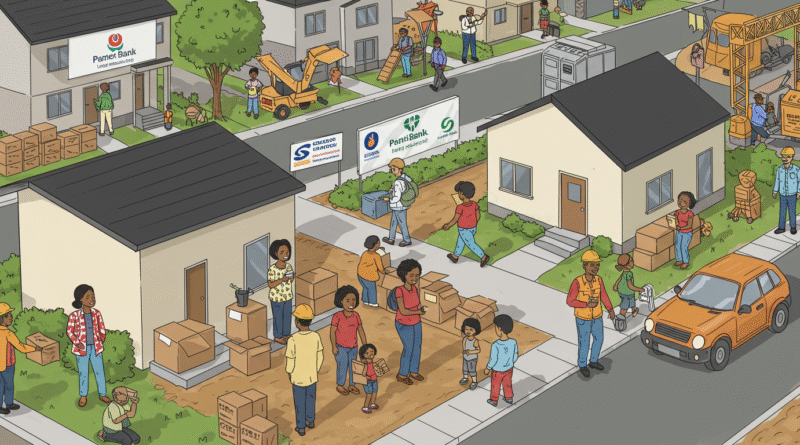Nigeria’s Housing Transformation
Nigeria is struggling with a severe housing shortage—estimates suggest a deficit exceeding 20 million units.
However, in response to that, the Ministry of Finance Incorporated (MOFI) has rolled out the Real Estate Investment Fund (MREIF). A forward-thinking, market-driven public-private partnership (PPP) designed to make homeownership accessible for more Nigerians.
And at the recent Africa International Housing Show (AIHS), MOFI’s Managing Director, Dr. Armstrong Takang, outlined how this fund aligns with President Bola Ahmed Tinubu’s Renewed Hope Agenda.
Furthermore, the goal is to shift Nigeria’s housing sector away from dependence on government subsidies and toward a sustainable, investment-led model.
Why MREIF Is a Breakthrough for Housing Finance
Unlike traditional housing schemes, MREIF raises funds by tapping into capital markets rather than relying solely on public budgets. In its pilot phase, it has already secured ₦250 billion as part of a larger ₦1 trillion program
Key benefits include:
- Single-digit mortgage rates have recently been reduced from 12% to 9.75% per annum.
- Flexible repayment periods of up to 20 years.
- Lower equity contributions, cutting down payment requirements from 20% to just 10%.
Additionally, the fund supports both sides of the market:
- Homebuyers gain access to affordable mortgage financing.
- Developers benefit from off-take guarantees that reduce project risk. With Securities and Exchange Commission (SEC) regulation and AAA/AA credit ratings from respected agencies like Agusto and GCR, MREIF stands out for its credibility and transparency.
Making Homeownership a Reality for More Nigerians
The fund is designed to be inclusive, catering to Nigerians across income brackets and even those in the diaspora. There are also Sharia-compliant, non-interest financing options, ensuring that ethical and faith-based preferences are respected.
By lowering entry barriers and offering fixed-rate mortgages, MREIF is turning what was once a dream into a practical reality for thousands of citizens.
Backed by Strong Partnerships
MREIF is not operating alone. It has secured collaboration with leading financial institutions such as:
- Access Bank
- FCMB
- Stanbic IBTC
- AG Mortgages
- Infinity Trust Mortgage Bank
These partnerships help extend the program’s reach to all six geopolitical zones, creating a truly nationwide impact. The fund’s Series to issuance being fully subscribed by private investors is further proof of market confidence in its structure and vision.
How High U.S. Mortgage Rates Impact Nigeria’s Housing Market
From Vision to Keys in Hand
The results are already visible:
- Nearly 400 Nigerians have purchased homes through the fund
- Over 22,000 potential buyers are registered and ready to take advantage of its terms.
Dr. Takang summed up the fund’s purpose perfectly: “This is not just another financing scheme—it’s a structured solution designed to reset how housing finance works in Nigeria.”
He also stressed that MREIF is more than a local initiative; it’s a replicable model that other African countries could adopt to tackle their housing deficits.
A Blueprint for Emerging Markets
MREIF’s long-term success will depend on consistent governance, strong execution, and public trust. However, its early achievements and strong structure suggest it could set a new standard for housing finance not just in Nigeria, but across emerging economies.
You can’t apply directly for the MOFI Real Estate Fund. Instead:
- Register with FMBN via the National Housing Fund.
- Use a primary mortgage bank (e.g., Abbey, Platinum, Infinity Trust) that partners with government housing projects.
- Follow MOFI updates at www.mofi.com.ng for new opportunities. The loan works through banks and mortgage institutions, not individuals. Start with FMBN or your mortgage bank.
Conclusion
Homebuyers—It means easier access to affordable, long-term mortgages.
Developers—It offers financial certainty with off-take guarantees.
Investors—It presents a stable, impact-driven investment opportunity.

